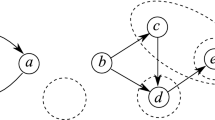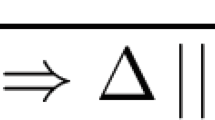Abstract
For each first-order languageL with a nonempty Herbrand universe, we construct an algebraC interpreting the function symbols ofL that is a model of the Clark equality theory with languageL and is canonical in the sense that for every definite clause programP in the languageL,T P C ↓ ω is the greatest fixed point ofT P C. The universe of individuals inC is a quotient of the set of terms ofL and is, a fortiori, countable ifL is countable. If ℒ contains at least one function symbol of arity at least 2, then the graphs of partial recursive functions onC, suitably defined, are representable in a natural way as individuals inC.
Similar content being viewed by others
References
H. Andreka and I. Nemeti, The generalized completeness of Horn predicate logic as a programming language, Acta Cybernetica 4 (1978) 3–10.
K.R. Apt and M.H. van Enden, Contributions to the theory of logic programming, J. ACM 29 (1982) 25–47.
H.A. Blair, The recursion-theoretic complexity of the semantics of predicate logic as a programming language, Information and Control 54 (1982) 25–47.
H.A. Blair, Canonical conservative extensions of logic program completions,IEEE Symp. on Logic Programming (August, 1987) pp. 154–161.
K.L. Clark, Negation as failure,Logic and Databases, H. Gallaire and J. Minker (eds.) (1978) pp. 293–324.
M. Fitting, A Kripke-Kleene semantics for logic programs, J. Logic Programming 2 (1985) 143–155.
J. Jaffar, J-L. Lassez and J.W. Lloyd, Completeness of the negation as failure rule,IJCAI-83 Proc., Karlsruhe (1983) pp. 500–506.
J. Jaffar, J-L. Lassez and M.J. Maher, Some issues and trends in the semantics of logic programming,Proc. 3rd Int. Conf. on Logic Programming, K.A. Bowen and E. Shapiro (eds.), London (July 1986) pp. 223–241, Lecture Notes in Computer Science, no. 225 (Springer, 1986).
J. Jaffar and P.J. Stuckey, Canonical logic programs, J. Logic Programming 3 (1986), 143–155.
K. Kunen, Negation in logic programming, J. Logic Programming 4 (1987) 289–308.
J.W. Lloyd,Foundations of Logic Programming, 2nd ed. (Springer, 1987).
J-L. Lassez and M.J. Maher, Closures and fairness in the semantics of programming logic, Theoretical Science 29 (1984) 167–184.
M.J. Maher, Complete axiomatizations of the algebras of finite, rational and infinite trees,3rd Logic in Computer Science Conf., Edinburgh (1988).
A. Martelli and U. Montanari, An efficient unification algorithm, ACM TOPLAS 4, no. 2 (1982) 258–282.
J.A. Robinson, A machine-oriented logic based on the resolution principle, J. ACM 12 (1965) 23–41.
J. Shoenfield,Mathematical Logic (Addison-Wesley, Reading, Mass., 1967).
M. Wallace, A computable semantics for general logic programs, J. Logic Programming 6 (1989) 269–297.
D.A. Wolfram, M.J. Maher and J.-L. Lassez, A unified treatment of resolution strategies for logic programs,Proc. 2nd Int. Logic Programming Conf., Uppsala, Sweden (1984) pp. 286–276.
Author information
Authors and Affiliations
Additional information
Research sponsored in part by U.S. Air Force Contract F30602-85-C-0008.
Rights and permissions
About this article
Cite this article
Blair, H.A., Brown, A.L. Definite clause programs are canonical (over a suitable domain). Ann Math Artif Intell 1, 1–19 (1990). https://doi.org/10.1007/BF01531067
Published:
Issue Date:
DOI: https://doi.org/10.1007/BF01531067




